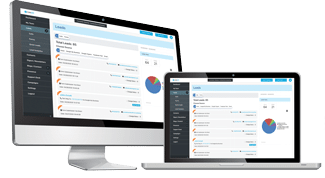
First, let’s talk a little about what CRM (Customer Relationship Management) means. Customer relationship management refers to the strategies and processes businesses use to mange interactions with customers, sales prospects and suppliers. CRM focuses on building and maintaining long-lasting relationships with all stakeholders (not to be confused with shareholders).
A CRM system is software that allows business to build and manage relationships more efficiently and effectively, which in turn results in higher sales and revenue. CRM systems originally were very costly and only used by large organizations, but now many vendors such as Infusionsoft are making CRM systems that are affordable and beneficial to small and mid-size businesses.
CRM systems allow businesses to store and access all of their data — sales, marketing and customer service — in one place. However, these are not just databases merely to store data. Different departments use the data differently, so a CRM system enables teams to collaborate and work toward the same goals while still meeting their individual objectives.
CRM systems give business the tools to learn about customers’ needs and buying habits, create and improve sales and marketing processes and provide better customer service throughout the entire customer lifecycle.
Benefits of Using a CRM System
Better Customer Service and Customer Experience: A CRM system gives you the ability to personalize and customize interactions with customers. By knowing and anticipating individual customer needs, you can quickly and successfully meet or exceed their expectations. Improved customer service builds a stronger, long-lasting relationship.
Improved Marketing Strategies: Learn what works for different customer demographics, which enables you to save money while increasing your customer base. Automated processes simplify and improve communication between you and your prospects and customers. Customers have more choices about how and when they want to be approached, which instills loyalty.
Simplified Sales Processes: Lead generation and tracking is improved, making for a faster sales cycle. Reduce costs by focusing efforts on only your strongest prospects. You also have a clearer idea of the sales pipeline and the effectiveness of sales members or teams.
Save Time While Increasing Revenue: Because you’re no longer wasting time on marketing efforts that aren’t working, chasing prospects who won’t become customers and muddling your way through inefficient processes, you can instead spend your time focusing on other important things (or take a real vacation!). In addition, because your relationship building will pay off in increased sales, your revenues will grow.
Almost all CRM systems provide some marketing and sales tools, but many don’t include additional features that may prove highly beneficial for your business. Be cautious about jumping into the first or least expensive CRM system you find. Do some research and learn about the variety of features available before you make a decision on which CRM system to use.
Click to learn more about what a CRM can do for your business.
What are some other benefits of using a CRM? Let us know in the comments section below!

